2020牛津译林版八年级下册Unit7Internationalcharities3
牛津译林初中八年级下册英语 Unit 7 International charities课件

How does this charity work?
It works in more than 90 countries to help poor people.
What will you do for the charities?
What are Eddie and Hobo doing? Are they ready to help the charity?
Listen to the tape with the following questions.
4. How far will they go?
They only have five kilometres left.
Complete the following passage.
Hobo hears that charity ne_e_d_s___ money. He wants to donate Eddie’s p_o_ck__et__ money to charity. But Eddie thinks it is lunch t_im__e_ because it’s 12 o’clock.
leave-left-left left (adj.) 剩下的,剩余的,没有用完的 修饰名词或不定代词时,通常后置
我只剩下一张票了。
I have only one _ti_c_k_e_t __le_f_t_. 冰箱里什么也没有剩下。
There is _n_o_t_h_in_g_ _l_e_ft__ in the fridge. leave for … 前往 leave 忘带,落在……
2020年牛津译林版八年级英语下册Unit7 International charities单元测试卷(B)含答案

Unit7 International charities单元测试卷(B)(时间:60分钟满分:100分)班级:_______ 姓名:_______ 得分:_______一、单项填空(共15小题;每小题1分,满分15分)( )1. If he has_______, he will_______ his research.A. time enough; carry on outB. enough time; carry on withC. enough time; carry with onD. time enough; carry with( )2. It's our duty to take action to_______ down trees and forests.A. keep people from cuttingB. prevent people cuttingC. stop people cuttingD. all the above( ) 3. Millie often makes telephone calls to her mother every day, _______ on Sunday.A. mostB. mostlyC. the mostD. much( )4. Do you have_______ to say about this film?A. something interestingB. interesting anythingC. anything interestingD. interesting something( )5. The books_______ well. Get one before they_______ out.A. are sold; are soldB. are sold; sellC. sell; are soldD. sell; sell( )6. -Do you think Brazil will beat(打败) Japan in the next match?-Yes, they have better players, so they_______ to win.A. are hopedB. expectC. are expectedD. were hoped( )7. The film made by Walt Disney_______ all over the world.A. is used to showB. is used to showingC. used to showD. used to be shown( )8. Linda's sister is_______ young_______ dress herself.A. so; thatB. such; thatC. too; toD. too; not to( )9. Mo Yan's books have been sold out in many book stores_______ his winning of the Nobel Literature Prize.A. becauseB. sinceC. asD. because of( )10. Li Ping_______ to give his best_______ to us.A. wishes; wishB. hopes; wishesC. wish; wishesD. hope; wish( )11. You'd better_______ here_______ it is raining heavily outside.A. not to leave; becauseB. not leave; becauseC. not leave; because ofD. not to leave; because of( )12. The sick boy needs_______ at once.A. to be operatedB. to operateC. to operate onD. to be operated on( )13. The doctor_______ on the man and_______ saved his life.A. did a operation; /B. did an operation; wasC. operated; /D. operated; was( )14. Most cases of blindness_______.A. can be prevent or cureB. can prevented or curedC. can be prevented or curedD. can be preventing or curing( )15. Finish your homework first, then you'll_______ play basketball with your partners.A. canB. be able toC. ableD. could二、完形填空(共10小题;每小题1分,满分10分)Have you seen the movie named Kung Fu ? Do you like Chinese Kung Fu? Chinese Kung Fu is very 1 and famous in the world. Many 2 are very interested in Chinese Kung Fu. They are admiring(羡慕) our Chinese Kung Fu very much. 3 you are in their country, they will ask you 4 you can play Chinese Kung Fu or not. If you can or even only say "Yes", they will ask you to teach them.But do you hear some Kung Fu food? 5 do you think if a restaurant is full of Kung Fu in it? There is a very special restaurant in Haikou. There is a very large Chinese word "Wu" on 6 face. It is the name of this restaurant. The menu in this restaurant is also about Kung Fu. All the rooms 7 by Chinese Kung Fu, too. The waiters are also 8 the Kung Fu clothes. They all speak like learning Kung Fu in the Wushu room. They learn from the movie named "Wulin Waizhuan". The boss of this restaurant 9 the boss in that film. She also hopes many foreigners and Chinese who love Kung Fu can come to her restaurant. We can learn more about Chinese Kung Fu and have some Kung Fu food there. Do you want 10 a try?( )1. A. interesting B. interested C. boring D. bored( )2. A. babies B. foreigners C. animals D. plants( )3. A. If B. As C. For D. Unless( )4. A. if B. how C. why D. whether( )5. A. How B. What C. When D. Where( )6. A. a B. his C. its D. her( )7. A. names B. are naming C. named D. are named( )8. A. wearing B. wears C. washing D. washes( )9. A. liking B. is like C. is liking D. like( )10. A. to go B. have C. to have D. go三、阅读理解(共10小题;每小题3分,满分30分)AIf you live in the United States, the law says you can't have a full-time job until you are 16 years old. At 14 0r 15, you can work part-time after school or on weekends, and during summer you can work 40 hours each week. Does all that mean that if you are younger than 14, you can't make your own money? Of course not! Kids who are between the ages of 10 and 13 can earn money by doing lots of things.V alerie, 11, told us that she made money by cleaning up other people's yards. Lena, 13,makes money by knitting (织) dog sweaters and selling them to her neighbours, and Reisa said she had started taking art classes and showing her work to people. People have asked her to draw pictures for-them and they pay her for them.Jasmine, 13, writes articles for different magazines! Earning is learning. By working to earn your own money, you are learning the skills you will need to succeed in life. These skills can include things like getting along with others, using technology and using your time. Some people think that asking for money is a lot easier than earning it. However, when you make your own money, you don't have to depend on someone else. The five dollars that you earn will probably make you feel a lot better in your hand than the twenty dollars you ask for.( )1. Kids can have full-time jobs at the age of_______ in the USA.A. 16B. 14C. 13D. 10( )2. Reisa makes money by_______.A. cleaning up other people's yardsB. drawing pictures for othersC. writing articles for different magazinesD. Knitting dog sweaters and selling them to her neighbours( )3. According to the passage, which of the following is NOT true?A. You are learning how to succeed by working in your teens.B. Kids are encouraged to live independently in the USA.C. Earning one s money is better than asking for money from others.D. Kids don't need to get along with others when making money.( )4. From the passage we know thatA. parents won't let their children earn their own moneyB. it is hard for kids under 14 years old to earn money in the USAC. kids can learn skills if they try to earn money on their ownD. if kids try to earn money, they won't have enough time to studyBThe bank of England is making plans to introduce plastic banknotes to the UK.Paper notes, meaning pieces of paper money, have been used in England for more than 300 years, but replacing them with plastic ones could be better.Plastic notes were first introduced to Australia back in 1988. Since then other countries, including Romania, Vietnam, Mexico and Malaysia, have also begun using money made in this way.Fans of water sports, such as surfing, find this type of money more useful and Easier, as they can take it with them in the water and won't worry that it will fall apart. It is also good for people who by mistake put clothes in the washing machine with a note in the pocket !It is more hygienic (clean and free of bacteria) than paper money as it absorbs less bacteria(the simplest and smallest form of plants, some of which cause disease). And it is stronger. This means it lasts longer. According to a survey, a usual 5 note in the UK lasts aroundsix months, while the $ 5 Australian bill lasts for an average of 40 months.A downside of plastic cash is that it costs more money to produce. Cash and money- counting machines will also have to be adapted to accept the new money.It is expected that the Bank of England, who hopes to start printing plastic notes from 2015, will introduce the money slowly, using the most common notes first.( )5. Which country was the first to use plastic notes?A. The UK.B. Romania.C. Vietnam.D. Australia.( )6. You can put the sentence "Besides being waterproof, there are other good effects of using plastic notes instead of paper ones. " at the beginning of_______.A. Paragraph 3B. Paragraph 4C. Paragraph 5D. Paragraph 6( )7. Which is NOT the reason why the UK wants to use plastic notes instead of paper ones?A. They take up less space.B. They are stronger.C. They don't let water through.D. They are more hygienic.CYou want to know about my staying in America, right? Well, to tell you the truth, it is really an eye-opening experience to study here.In China, I had English classes five times a week since fifth grade. However, I didn't know how different textbook English could be from everyday English until I came to Hotchkiss School, Connecticut.When I first studied English, I was told to say, "I am fine. " when people say "How are you?" But in the US, I found that people say, "I am good" or "I'm tired".One day, someone greeted me with "What's up?" It made me confused. I thought for a moment and then smiled because I didn't know what to say. Since then, I have discovered more and more differences between Chinese and US cultures.To my surprise, US girls spend a lot of time in the burning sun to get a tan(晒黑). However, in China, girls try every possible way to get their skin paler, or "whiter".I was also surprised by how hardworking US students are. In China, schoolwork is almost everything, so we study hard and that's it. But here, a "good" student gets good grades, does a lot for the public and plays sports or music.The kids here are so talented, I am starting to be sorry that I gave up playing the piano at an early age and that I have never thought about sports.( )8. What does the word "confused" in the fourth paragraph mean in Chinese?A.困惑B.憧憬C.悲痛D.后悔( )9.A good US student spends his or her time_______.A. only in doing homeworkB. on studies, sports or music and public workC. only in working for the publicD. only on sports or music( )10. Which of the following is NOT true?A. The writer is now in US.B. American girls love to have white skin.C. US students are talented and hard working.D. The writer regrets that he gave up playing the piano.DDecide to Do WellEverybody makes decisions in daily life. They can be as important as what you will do in the future or as simple as what you will eat for breakfast. Any decision could be the turning point of your life.I made an important decision when I was in Junior 3.Before I made that decision I was one of the boys who tried too hard to act as an adult. I didn’t know that only kids want to show themselves as adults.I didn’t listen to my parents and teachers, and my grades became poor. Then came the high school entrance exam.At the turning point of my life, my mom wanted to have a conversation with me. I wanted to turn it down but when I looked at her eyes, I felt I couldn’t refuse. Instead of asking me to study hard, to my surprise, Mom just asked what I wanted to do in the future. Without thinking too much, I just said I would like to study hard.Mom smiled and asked again: “I asked: what do you WANT to do?”I never seriously thought about the question. So, I kept silent.“Whether you want to go on studying or enter the society,” she went on, “it is your own decision. Your life ought to be decided by you, not by anyone else, including me. ” After saying that, she had tears in her eyes.For the first time in my life I was asked to make my own decision. I sat in my chair and thought about myself, my life and what kind of person I wanted to become.It took me what seemed to be ages to make the biggest decision so far in my life—I wanted to be a man who makes a difference in the world. To achieve that, I needed to study hard.The path to my future became clear to me. I didn’t act rebelliously(叛逆地) any more. With passion (激情) in my heart, I studied hard.Now, I’m 17 and I’m in one of the best schools in my city, in one of the best classes at the school and I am one of the best students in the class.Thanks to that decision, I have become what I am today.( )11.When did the writer make the important decision?A.After he was 17 years old. B.After he was in one of the best classes.C.When he was a pupil. D.When he was studying in Junior 3. ( )12.What was the writer like before the decision?A.His grades became poor.B.He tried too hard not to act as an adult.C.He was one of the top students in his class.D.He did what his teachers and his parents asked him to do.( )13.How did the writer make the decision?A.It was easy for him to make the decision.B.It was his second time to make the decision.C.He made the decision seriously.D.It was his mother that made the decision for him.( )14.Why did the writer make the decision?A.Because his teacher talked with him patiently.B.Because he didn’t want to act rebelliously any more.C.Because his mother asked him to study hard as usual.D.Because his father asked him to think about his future by himself.( )15.Which of the following is TRUE?A.The writer made the decision that he should work hard.B.It took the writer several years to make the decision.C.After hearing his mother’s words, the writer had tears in his eyes.D.At the turning point of his life, the writer wanted to have a conversation with his mother.四、词汇检测(共10小题;每小题1分,满分10分)根据下列句子及所给汉语注释或通过上下文,写出空缺处各单词的正确形式。
牛津译林版英语八年级下册《Unit 7 International Charities Welcom
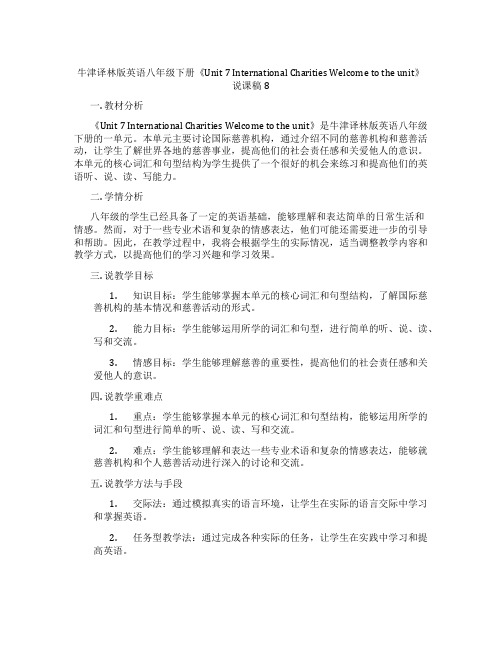
牛津译林版英语八年级下册《Unit 7 International Charities Welcome to the unit》说课稿8一. 教材分析《Unit 7 International Charities Welcome to the unit》是牛津译林版英语八年级下册的一单元。
本单元主要讨论国际慈善机构,通过介绍不同的慈善机构和慈善活动,让学生了解世界各地的慈善事业,提高他们的社会责任感和关爱他人的意识。
本单元的核心词汇和句型结构为学生提供了一个很好的机会来练习和提高他们的英语听、说、读、写能力。
二. 学情分析八年级的学生已经具备了一定的英语基础,能够理解和表达简单的日常生活和情感。
然而,对于一些专业术语和复杂的情感表达,他们可能还需要进一步的引导和帮助。
因此,在教学过程中,我将会根据学生的实际情况,适当调整教学内容和教学方式,以提高他们的学习兴趣和学习效果。
三. 说教学目标1.知识目标:学生能够掌握本单元的核心词汇和句型结构,了解国际慈善机构的基本情况和慈善活动的形式。
2.能力目标:学生能够运用所学的词汇和句型,进行简单的听、说、读、写和交流。
3.情感目标:学生能够理解慈善的重要性,提高他们的社会责任感和关爱他人的意识。
四. 说教学重难点1.重点:学生能够掌握本单元的核心词汇和句型结构,能够运用所学的词汇和句型进行简单的听、说、读、写和交流。
2.难点:学生能够理解和表达一些专业术语和复杂的情感表达,能够就慈善机构和个人慈善活动进行深入的讨论和交流。
五. 说教学方法与手段1.交际法:通过模拟真实的语言环境,让学生在实际的语言交际中学习和掌握英语。
2.任务型教学法:通过完成各种实际的任务,让学生在实践中学习和提高英语。
3.情境教学法:通过创设各种真实的情境,让学生在情境中学习和理解英语。
六. 说教学过程1.导入:通过展示一些慈善机构的图片,引导学生谈论慈善机构和个人慈善活动,激发他们的学习兴趣。
牛津译林版英语八下Unit 7《International charities》(Task)教学设计

牛津译林版英语八下Unit 7《International charities》(Task)教学设计一. 教材分析牛津译林版英语八下Unit 7《International charities》主要介绍了世界各地的慈善机构,以及人们如何参与慈善活动。
通过本单元的学习,学生能够了解不同慈善机构的宗旨和活动,提高自己的跨文化交际能力。
Task部分要求学生就慈善机构的选择和参与活动进行讨论,旨在培养学生的语言运用能力和合作精神。
二. 学情分析八年级的学生已经具备了一定的英语基础,能够理解和运用所学知识进行简单的交流。
但他们在词汇量和语法知识方面仍有待提高,特别是对于慈善机构的认识和了解。
因此,在教学过程中,教师需要关注学生的个体差异,充分调动他们的学习积极性,引导他们主动参与课堂活动。
三. 教学目标1.知识目标:学生能够掌握与慈善机构相关的词汇和表达,了解不同慈善机构的宗旨和活动。
2.能力目标:学生能够用英语讨论慈善机构的选择和参与活动,提高自己的语言运用能力。
3.情感目标:培养学生关爱他人、乐于助人的品质,激发他们参与慈善活动的热情。
四. 教学重难点1.重点:慈善机构的名称、宗旨和活动。
2.难点:如何用英语表达自己的观点和意愿,进行有效的讨论。
五. 教学方法1.任务型教学法:通过完成具体任务,引导学生主动参与课堂,提高语言运用能力。
2.合作学习法:分组讨论,培养学生的团队协作能力和沟通能力。
3.情景教学法:创设真实的语境,帮助学生理解和运用所学知识。
六. 教学准备1.教师准备:提前了解慈善机构的相关知识,制作课件和教学素材。
2.学生准备:预习相关词汇和表达,了解慈善机构的的基本概念。
七. 教学过程1.导入(5分钟)教师通过向学生介绍自己参与的慈善活动,引发学生对慈善机构的兴趣,导入新课。
2.呈现(10分钟)教师展示慈善机构的图片和相关信息,引导学生关注慈善机构的名称、宗旨和活动。
3.操练(15分钟)学生分组讨论,每组选择一个慈善机构,用英语介绍其宗旨和活动。
牛津译林版英语八年级下册课件Unit 7 International charit Task课件新
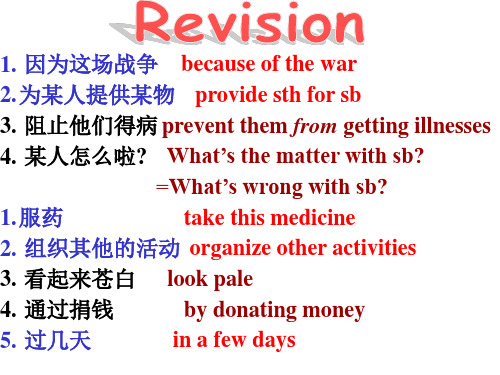
根据句意及中文提示完成单词 (抢答时间)
1. Thousands of people __a_t_te__n_d_e_d(出席)the
meeting last week.
2. The girl with long hair is a __s_e_c_r_e_t_a_ry__( 秘书)
of my company.
3. What did Mandeep use to do ?
A farmer.
4. What does she do now ?
A student .
C You want to write a report on the work of UNICEF. Search for information on the Internet. You can also use the information below. Use Amy’s report as a model.
One day, a UNICEF worker came to Mandeep’s village and learnt about the conditions of the local people.
He said it was important for children to receive education. He wanted all the children in the village to learn to read.
Diana was afraid of flying.
A: What did she learn about on TV ? B: She learnt about ORBIS on TV.
A: What was she doing ? B: She was training as a nurse.
牛津译林版八年级下册英语教案Unit7InternationalcharitiesTask
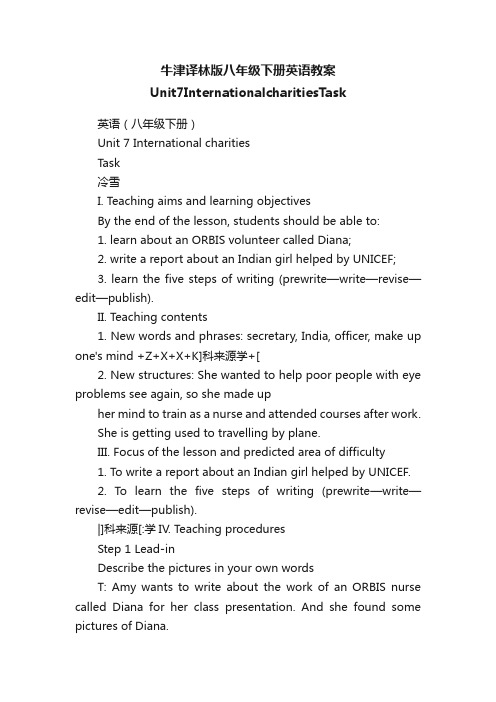
牛津译林版八年级下册英语教案Unit7InternationalcharitiesTask英语(八年级下册)Unit 7 International charitiesTask冷雪I. Teaching aims and learning objectivesBy the end of the lesson, students should be able to:1. learn about an ORBIS volunteer called Diana;2. write a report about an Indian girl helped by UNICEF;3. learn the five steps of writing (prewrite—write—revise—edit—publish).II. Teaching contents1. New words and phrases: secretary, India, officer, make up one's mind +Z+X+X+K]科来源学+[2. New structures: She wanted to help poor people with eye problems see again, so she made upher mind to train as a nurse and attended courses after work.She is getting used to travelling by plane.III. Focus of the lesson and predicted area of difficulty1. To write a report about an Indian girl helped by UNICEF.2. To learn the five steps of writing (prewrite—write—revise—edit—publish).|]科来源[:学IV. Teaching proceduresStep 1 Lead-inDescribe the pictures in your own wordsT: Amy wants to write about the work of an ORBIS nurse called Diana for her class presentation. And she found some pictures of Diana.T: Look at these two pictures. Can you guess Diana's job in the past? As you see, she was anoffice lady, a secretary of a pany. Did she look happy? Look at the second one. What does shedo now? Does she look happy? Why does she change the job and what happened? Try todescribe the pictures in your own words.,]科来源[学Step 2 Reading prehension1. Discuss the picturesStudents read the six pictures carefully. They can ask any question about the story, and invitethe other students to answer. They can get the answer from the report or use their imagination toget reasonable answers.The teacher gives six questions. Students read and underline the answers in the report.(1) What was her life like?(2) Which does she like better, travelling by car or by plane?(3) In which way did she learn about ORBIS?(4) After learning about it, how did she feel and what did she do?(5) What is her life like now?(6) How does she feel about the changes?2. Analyze the structure of the articleT: Now please find the topic sentences of each paragraph, and get the main idea of each paragraph. [来源:]3. pare the lives in the past and at presentT: The first paragraph and the third paragraph tell Diana's work, lifestyle and way of travelling. They have similar structures.Step 3 Writing practice1. How to writeShow the five steps of writing; indicate that we should write step-by-step.2. Prewriting—choose a topic/collect details(1) Ask students to write about an Indian girl helped by UNICEF and show the pictures and the information. Show the subject, form, purpose and audience.(2) Ask students to plete a 5 W's chart.Writing tips: An experience includes the basic details, sensory details and dialogues.(3) Ask students to put things in order.Ask students to use the time line to organize things in time order.3. Writing—write a first draft: a beginning + a middle + an ending :ZXXK]来源[Show the structure of the report.(1) The beginning should get the readers' attention and introduce the experience. Show threeways to begin:a. Start with dialogues;b. Begin with a fact or an interesting statement;c. Put yourself in the middle of the action.Give three examples and encourage students to write their own.(2) The middle part tells story in time order. It may include sensory details, use dialogues, and share the feelings people experienced.Give a model middle and guide the students to pay attention to the transition words andsensory details.(3) The ending should bring the story to a close. Show three possible ways:a. Tell what you learnt from the experience;b. Explain how the experience changed you;c. Tell how you felt about the experience.Give three examples and encourage students to write their own.4. Revising—improve your writing(1) Show the steps to revise.Read—review—ask—change(2) Add and move parts.Use the model passage to show how to add and move parts and explains why.5. Editing—check for errorsInvite the students to check the article for punctuation, capitalization, grammar error and spelling.6. Publishing—share your writingShow the final copy.Give two tips:a. Use blue or black ink and write neatly;b. Indent every paragraph and leave a one-inch margin of all sides.7. Assessing the final copyShow how to assess the final copy.8. Reflecting on your writingReflect by answering four questions.9. The advantages of writingShow the advantages of writing:bee a better student, understand your experience, connect with others, enjoy life ... Encourage the students to write more.10. Write your articleV. Homework1. Make your article better.2. Put the best articles onto the wall and enjoy together. 附件1:律师事务所反盗版维权声明附件2:独家资源交换签约学校名录(放大查看)学校名录参见:://.。
牛津译林版英语八年级下册《Unit 7 International Charities Welcom

牛津译林版英语八年级下册《Unit 7 International Charities Welcome to the unit》说课稿1一. 教材分析《Unit 7 International Charities Welcome to the unit》是人教版牛津译林英语八年级下册的一单元。
本单元的主题是国际慈善机构,主要介绍了一些国际知名慈善机构及其公益活动。
教材通过丰富的文本材料,引导学生关注社会问题,培养学生的社会责任感和同情心。
本单元的主要内容包括:1. 介绍几家国际慈善机构,如红十字会、绿色和平等;2. 讨论慈善机构的作用和意义;3. 引导学生思考如何参与慈善活动,如何关爱他人。
二. 学情分析八年级的学生已经具备了一定的英语基础,能够进行简单的阅读、听说和写作。
但他们在语言表达、逻辑思维、文化背景等方面还存在一定的困难。
因此,在教学过程中,教师需要关注学生的个体差异,充分调动他们的积极性,激发他们的学习兴趣。
三. 说教学目标1.知识目标:学生能够掌握本单元的重点词汇、句型和语法结构,了解国际慈善机构的基本情况。
2.能力目标:学生能够运用英语进行简单的阅读、听说和写作,提高他们的英语综合运用能力。
3.情感目标:学生能够关注社会问题,培养他们的社会责任感和同情心,学会关爱他人。
四. 说教学重难点1.重点:本单元的重点词汇、句型和语法结构。
2.难点:慈善机构的作用和意义,以及如何参与慈善活动。
五. 说教学方法与手段1.教学方法:采用任务型教学法,让学生在完成任务的过程中,自然地学习和掌握语言知识。
2.教学手段:利用多媒体课件、网络资源等,为学生提供丰富的学习材料,提高他们的学习兴趣。
六. 说教学过程1.导入:通过展示一些国际慈善机构的图片,引导学生关注本节课的主题。
2.呈现:介绍一些国际知名慈善机构,如红十字会、绿色和平等,让学生了解它们的基本情况。
3.探究:讨论慈善机构的作用和意义,引导学生思考如何参与慈善活动,如何关爱他人。
牛津译林版英语八年级下册《Unit 7 International Charities Welcom
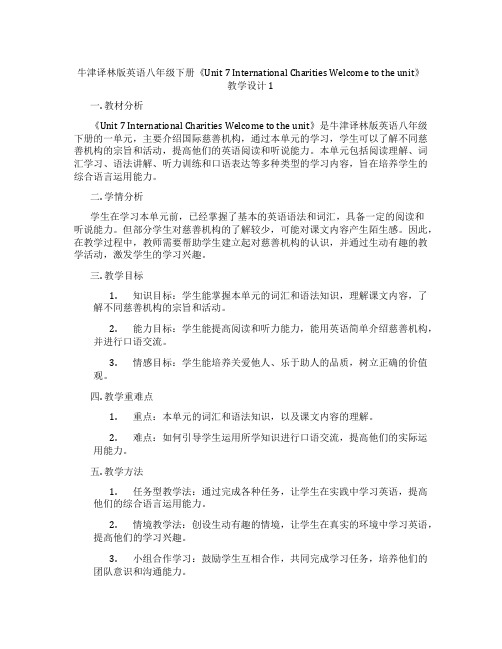
牛津译林版英语八年级下册《Unit 7 International Charities Welcome to the unit》教学设计1一. 教材分析《Unit 7 International Charities Welcome to the unit》是牛津译林版英语八年级下册的一单元,主要介绍国际慈善机构,通过本单元的学习,学生可以了解不同慈善机构的宗旨和活动,提高他们的英语阅读和听说能力。
本单元包括阅读理解、词汇学习、语法讲解、听力训练和口语表达等多种类型的学习内容,旨在培养学生的综合语言运用能力。
二. 学情分析学生在学习本单元前,已经掌握了基本的英语语法和词汇,具备一定的阅读和听说能力。
但部分学生对慈善机构的了解较少,可能对课文内容产生陌生感。
因此,在教学过程中,教师需要帮助学生建立起对慈善机构的认识,并通过生动有趣的教学活动,激发学生的学习兴趣。
三. 教学目标1.知识目标:学生能掌握本单元的词汇和语法知识,理解课文内容,了解不同慈善机构的宗旨和活动。
2.能力目标:学生能提高阅读和听力能力,能用英语简单介绍慈善机构,并进行口语交流。
3.情感目标:学生能培养关爱他人、乐于助人的品质,树立正确的价值观。
四. 教学重难点1.重点:本单元的词汇和语法知识,以及课文内容的理解。
2.难点:如何引导学生运用所学知识进行口语交流,提高他们的实际运用能力。
五. 教学方法1.任务型教学法:通过完成各种任务,让学生在实践中学习英语,提高他们的综合语言运用能力。
2.情境教学法:创设生动有趣的情境,让学生在真实的环境中学习英语,提高他们的学习兴趣。
3.小组合作学习:鼓励学生互相合作,共同完成学习任务,培养他们的团队意识和沟通能力。
六. 教学准备1.教学课件:制作课件,内容包括课文讲解、词汇学习、语法讲解等。
2.教学素材:收集关于慈善机构的图片、视频等素材,用于教学展示。
3.听力材料:准备相关的听力材料,用于训练学生的听力能力。
牛津译林版英语八年级下册《Unit 7 International Charities Welcom

牛津译林版英语八年级下册《Unit 7 International Charities Welcome to the unit》说课稿7一. 教材分析《Unit 7 International Charities Welcome to the unit》是人教版牛津译林八年级下册的一单元。
本单元主题是国际慈善机构,主要介绍了世界各地的慈善机构和慈善活动。
教材通过真实的语言环境,让学生了解和掌握慈善机构的宗旨、活动以及如何参与其中。
本单元的语言知识点包括一般现在时的被动语态、不定式作目的状语等。
二. 学情分析八年级的学生已经掌握了基本的英语语法知识,具备一定的听说读写能力。
但他们对慈善机构的了解可能有限,对国际慈善机构的认识可能更为陌生。
因此,在教学过程中,需要帮助学生建立起慈善机构的基本概念,同时提高他们的语言运用能力。
三. 说教学目标1.知识目标:让学生掌握本单元的生词、短语和语法点,了解国际慈善机构的基本情况。
2.能力目标:培养学生听、说、读、写的能力,使他们能够熟练运用所学知识描述慈善机构及其活动。
3.情感目标:培养学生关爱他人、乐于助人的品质,提高他们的社会责任感和公民意识。
四. 说教学重难点1.重点:本单元的生词、短语和语法点。
2.难点:一般现在时的被动语态和不定式作目的状语的运用。
五. 说教学方法与手段1.教学方法:采用任务型教学法,让学生在真实的语言环境中进行交际和实践。
2.教学手段:利用多媒体课件、图片、视频等辅助教学,激发学生的学习兴趣,提高课堂效果。
六. 说教学过程1.导入:通过展示慈善机构的图片,引导学生谈论慈善机构,引入本课主题。
2.新课呈现:介绍慈善机构的基本概念,讲解一般现在时的被动语态和不定式作目的状语的用法。
3.练习巩固:通过小组活动、角色扮演等形式,让学生运用所学知识进行实际操作。
4.拓展延伸:讨论如何参与慈善活动,提高学生的社会责任感和公民意识。
5.总结反馈:对本节课的内容进行总结,检查学生的掌握情况。
牛津译林版八年级英语下册Unit7单元知识点总结
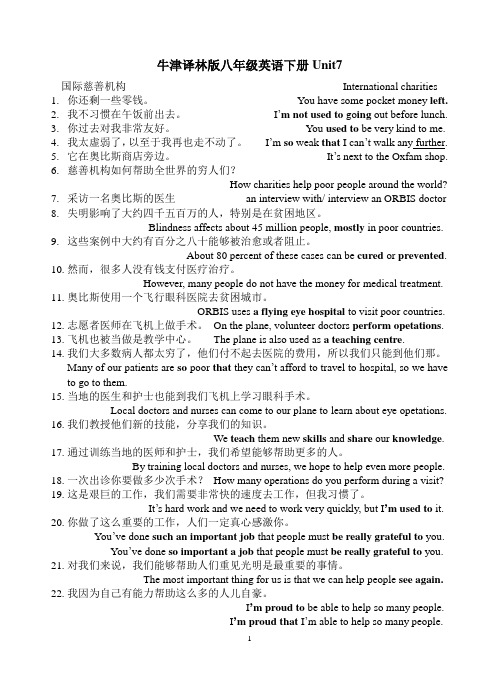
牛津译林版八年级英语下册Unit7国际慈善机构International charities1.你还剩一些零钱。
You have some pocket money left.2.我不习惯在午饭前出去。
I’m not used to go ing out before lunch.3.你过去对我非常友好。
You used to be very kind to me.4.我太虚弱了,以至于我再也走不动了。
I’m so weak that I can’t walk any further.5.它在奥比斯商店旁边。
It’s next to the Oxfam shop.6.慈善机构如何帮助全世界的穷人们?How charities help poor people around the world?7.采访一名奥比斯的医生an interview with/ interview an ORBIS doctor8.失明影响了大约四千五百万的人,特别是在贫困地区。
Blindness affects about 45 million people, mostly in poor countries.9.这些案例中大约有百分之八十能够被治愈或者阻止。
About 80 percent of these cases can be cured or prevented.10.然而,很多人没有钱支付医疗治疗。
However, many people do not have the money for medical treatment.11.奥比斯使用一个飞行眼科医院去贫困城市。
ORBIS uses a flying eye hospital to visit poor countries.12.志愿者医师在飞机上做手术。
On the plane, volunteer doctors perform opetations.13.飞机也被当做是教学中心。
牛津译林版英语八下Unit 7《International charities》(welcome t

牛津译林版英语八下Unit 7《International charities》(welcome to unit)教学设计一. 教材分析牛津译林版英语八下Unit 7《International charities》主要介绍国际慈善,通过学习本单元,学生能够了解不同慈善的宗旨、活动以及如何参与其中。
教材以真实的慈善活动为背景,引导学生关注社会问题,培养学生的社会责任感和关爱他人的意识。
本单元包括阅读、听说、写作等多种技能训练,有助于提高学生的综合语言运用能力。
二. 学情分析八年级的学生已经具备了一定的英语基础,能够理解和运用简单的英语进行日常交流。
但他们在阅读理解、听力、口语表达等方面还存在一定的困难。
此外,学生对于慈善的了解相对较少,因此需要在教学中引入相关背景知识,帮助学生更好地理解教材内容。
三. 教学目标1.知识目标:学生能够掌握与国际慈善相关的词汇和表达方式,了解不同慈善的宗旨和活动。
2.技能目标:学生能够通过阅读、听说、写作等方式,运用所学知识进行交流和表达。
3.情感目标:学生能够培养关爱他人、关注社会的意识,提高社会责任感和同理心。
四. 教学重难点1.重点:学生能够掌握与国际慈善相关的词汇和表达方式,了解不同慈善的宗旨和活动。
2.难点:学生能够运用所学知识进行阅读理解、听力、口语表达和写作。
五. 教学方法1.任务型教学法:通过小组讨论、角色扮演等任务,激发学生的学习兴趣,提高学生的参与度。
2.情境教学法:创设真实的生活情境,让学生在实践中感知和运用英语。
3.交际式教学法:注重师生互动、生生互动,提高学生的口语表达能力和听力理解能力。
六. 教学准备1.教师准备:提前准备好教材、教学PPT、相关视频和音频材料、慈善的宣传册等。
2.学生准备:学生提前预习教材,了解慈善的相关背景知识。
七. 教学过程1.导入(5分钟)教师通过展示一些国际知名慈善的图片,如红十字会、世界自然基金会等,引导学生关注慈善,激发学生的学习兴趣。
牛津译林版八年级英语下册课件Unit7Internationalcharities-welcome
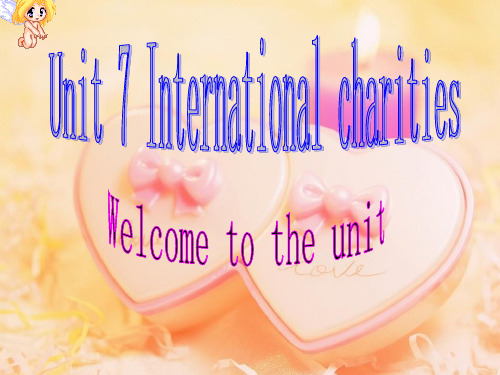
Listen and answer the questions
• 1. What is needed for charity ?
More money is needed for chartity.
• 2. What does Hobo want Eddie to do ?
He wants Eddie to donate his pocket money .
A.to leave B.leaving C.left D.leave
B( )2.We will have a______discussion_______that plan.
A.fartherபைடு நூலகம்on B.further;on
C.further;in D.farther;about
A( )3.My father______his mobile phone at home,so he looked_____.
造一个更好的世界。
It helps build a better world for everyone , especially children all over the world.
13.它给贫穷地区的孩子们提供基础教育。 It provides basic education for children in poor areas. 14.它也为女孩和妇女们争取平等的权利。 It works for the rights of girls and women too. 15.它也努力阻止一些严重疾病的扩散,
at . 升起的太阳看起来特别美。
5.It provides basic education for children in poor areas.
牛津译林初中八年级下册英语 Unit 7 International Charities
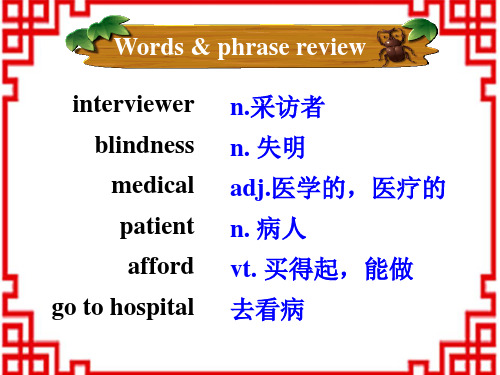
7-20lines: • Why do ORBIS doctors and nurses work on the
plane? • Is the plane only a place to do operations? • How does Dr Ma feel about the job?
1. Many patients can’t afford to go to hospital, so ORBIS doctors and nurses have to go to them.
4. He will come on time even though it rains.
4. 即使下雨,他还是会准时来的。 55. .T船he上re有ar5e0500名0乘pa客sse。ngers on board.
Game time
Now I will divide you into several groups. Make up sentences with your partners with “on”. Then speak them out. Let’s see which group is the most productive.
地 面:通过在全球五个国家的长期项目大规模 建立眼睛护理及防盲基础设施。
网络空间:通过新建立的网络视讯项目连接世 界各地的签约眼科专家,用互联网进行一对一的 技术指导以及针对单个病例的会诊。
Listen and answer
牛津译林版八年级下册Unit 7 International Charities Integrate
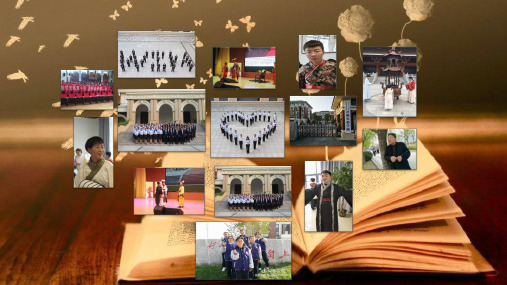
Question mark
Does it a question mark?
Examples
Would you like some coffee? How does UNICEF help?
at the end of a direct question
Question mark (?)
What time is the party?
I am used at the end of a sentence that is not
a question or an exclamation.
Examples
Can you give me an example?
She is my sister.
The 12th Special Olympics World Games were held in Shanghai in 2007.
Examples
You can visit A__si_a_, A__fr_ic_a_, E_u_r_o_p_e_, A_m__er_i_ca_n_
牛津译林八年级下Unit 7 International charities短语
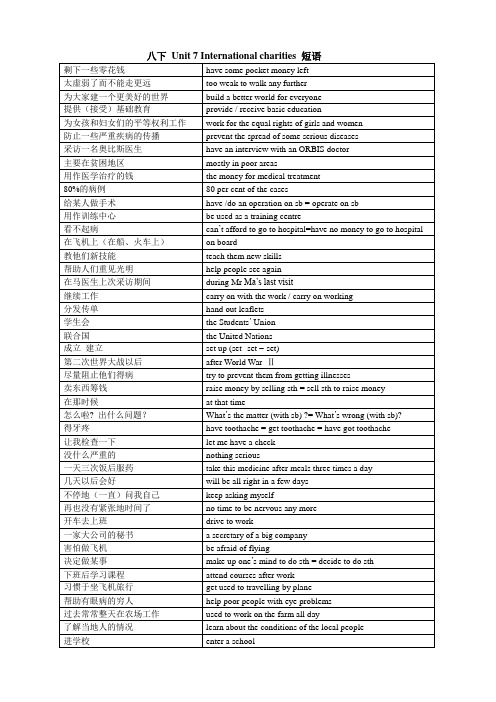
attend courses after work
习惯于坐飞机旅行
get used to travelling by plane
帮助有眼病的穷人
help poor people with eye problems
过去常常整天在农场工作
used to work on the farm all day
用作训练中心
be used as a training centre
看不起病
can’t afford to go to hospital=have no money to go to hospital
在飞机上(在船、火车上)
on board
教他们新技能
teach them new skills
帮助人们重见光明
了解当地人的情况
learnabout the conditions of the local people
进学校
enter a school
no time to be nervous any more
开车去上班
drive to work
一家大公司的秘书
a secretary of ying
决定做某事
make up one’s mind to do sth = decide to do sth
提供(接受)基础教育
provide / receive basic education
为女孩和妇女们的平等权利工作
work for the equal rights of girls and women
防止一些严重疾病的传播
prevent the spread of some serious diseases
2020学年牛津译林版八年级英语下册课件:Unit 7 International Charities Task (共27张PPT).ppt
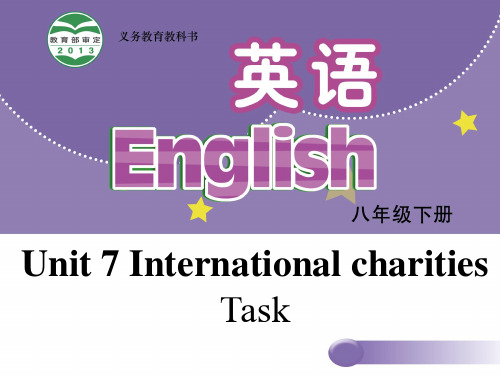
Write a first draft
The middle part tells the story. It should be organized in time order. Here are some other things to keep in mind.
▉ Include sensory details. ▉ Use quotations and dialogues. ▉ Share the feelings people experienced.
▉ Explain how the experience changed you.
UNICEF totally changed Mandeep’s life. Now she usually reads for her families. She says that she hopes to become a
Discuss the pictures.
She trained as a nurse. After learning about it, how did she think and what did she do?
She works for ORBIS. What is her life like now?
▉ Tell what you learnt from the experience.
“It’s great to help others,” Mandeep says. “I’ll try my best to study, so that maybe in the future I will be able to help others too. ”
Before you start, review your details to make sure you don’t forget anything.
2020牛津译林版八年级下册Unit7Internationalcharities6
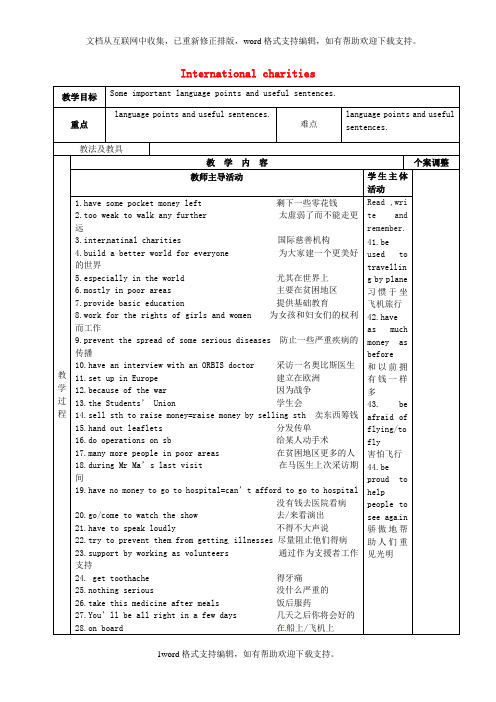
International charities教学目标Some important language points and useful sentences.重点 language points and useful sentences.难点language points and usefulsentences.教法及教具教学过程教学内容个案调整教师主导活动学生主体活动1.have some pocket money left 剩下一些零花钱2.too weak to walk any further 太虚弱了而不能走更远3.inter natinal charities 国际慈善机构4.build a better world for everyone 为大家建一个更美好的世界5.especially in the world 尤其在世界上6.mostly in poor areas 主要在贫困地区7.provide basic education 提供基础教育8.work for the rights of girls and women 为女孩和妇女们的权利而工作9.prevent the spread of some serious diseases 防止一些严重疾病的传播10.have an interview with an ORBIS doctor 采访一名奥比斯医生11.set up in Europe 建立在欧洲12.because of the war 因为战争13.the Students’ Union 学生会14.sell sth to raise money=raise money by selling sth 卖东西筹钱15.hand out leaflets 分发传单16.do operations on sb 给某人动手术17.many more people in poor areas 在贫困地区更多的人18.during Mr Ma’s last visit 在马医生上次采访期间19.have no money to go to hospital=can’t afford to go to hospital没有钱去医院看病20.go/come to watch the show 去/来看演出21.have to speak loudly 不得不大声说22.try to prevent them from getting illnesses 尽量阻止他们得病23.support by working as volunteers 通过作为支援者工作支持24. get toothache 得牙痛25.nothing serious 没什么严重的26.take this medicine after meals 饭后服药27.You’ll be all right in a few days 几天之后你将会好的28.on board 在船上/飞机上Read ,write andremember.41.beused totravelling by plane习惯于坐飞机旅行42.haveas muchmoney asbefore和以前拥有钱一样多43. beafraid offlying/tofly害怕飞行44.beproud tohelppeople tosee aga in骄傲地帮助人们重见光明29. teach them new skills 教他们新技能30.help people see again 帮助人们重见光明31.do an eye operation 动一次眼科手术32.a Flying Eye Hospital 一家飞行眼科医院33. something els e 其它一些东西34.say to our readers 对我们的读者说35.modern medicine 现代医学36.most eye problems and diseases 大多数眼睛问题和疾病37.carry on with our work/ carry on working 继续我们的工作38.the money for medical treatment 用作为医学治疗的钱39.attend courses after work 下班后学习课程40.300 days a year 一年300天板书设计教学札记。
牛津译林版八年级英语下册Unit7InternationalCharitiesP1Welcometotheunit精品课件
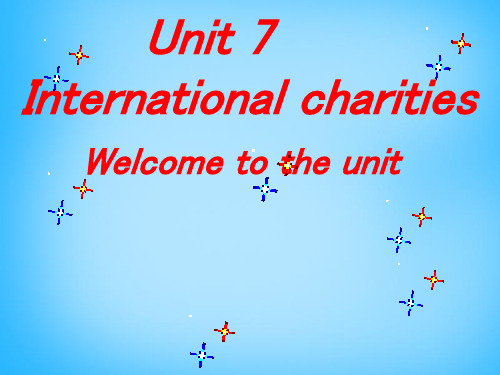
China Charity Federation
China Disabled Persons’ Federation 中国残疾人联合会
One Foundation 壹基金
China Youth Development
Foundation 中国青少年发展基金会
How does …help people?
(3)work for the equal rights of girls and women (4)prevent the spread of serious diseases (1)build a better world for everyone especially
children
(2)provides basic education for children in poor
A. prevent B. cause C. discover
[例4]2012山东 I still don’t understand it. Can you give me a ____
example? A. further B. farther C. far D. furthest
1.Do you know about any __________(国际的) _________(charity ). 2.I know about a charity ________(call) UNICEF. 3.More money is ______(need) for charity. 4.You have some pocket money _________(leave). 5.Don’t be _________(worry). 6.I’m too weak ________(walk) _______(some) _______(far). 7.The boy’s parents try to prevent him from ____(go) to net bars.
- 1、下载文档前请自行甄别文档内容的完整性,平台不提供额外的编辑、内容补充、找答案等附加服务。
- 2、"仅部分预览"的文档,不可在线预览部分如存在完整性等问题,可反馈申请退款(可完整预览的文档不适用该条件!)。
- 3、如文档侵犯您的权益,请联系客服反馈,我们会尽快为您处理(人工客服工作时间:9:00-18:30)。
International charities
教学目标1. Understand open questions used in an interview.
2. Know something about the general conditions of ORBIS workers.
e proper language to introduce work of ORBIS doctors.
重点1.Understand open questions used in an
interview.
2. Know something about the general
conditions of workers of ORBIS.
难点
1.Understand open questions
used in an interview.
2. Know something about the
general conditions of workers
of ORBIS.
教法及教具Some pictures and a tape recorder.
教学过程
教学内容个案调整
教师主导活动学生主体活动
Step 1 Lead-in
Ask if Ss. Know anyone who works for a charity, and if so,
which charity and what they do.
Step2 Presentation
1.T writes “ORBIS” on the blackboard. Ask Ss what they know
about ORBIS or whether they have heard of it before doing the
Welcome to the unit exercise. Talk about blindness and how it
might affect a person’s life.
2. Listen to the tape about the reading, and then ask Ss to
read the text by themselves again.
3. Ask Ss some questions to check th eir understanding and
encourage sts. to think more a bout the topic.
(1)About 285million people around the world are blind or and
all of them can be cured .
(2)ORBIS doctors do operations in the local hospitals .
(3)Dr Ma dislikes his work because it is too boring .
(4)Dr Ma hopes more people can support their work
Talk about
blindness .
Answer the
questions .
(1)F
(2)F
(3)F
(4)T
教学内容个案调整教师主导活动学生主体活动
4.Ask them to read the dialogue again and answer :
(1)How many people are blind or have eye problems around the world ?Where are they mostly from ?
(2)Do these people receive medical treatment ?
(3)Why do ORBIS doctors and nurses work on a plane ?
(4)Is the plane only a place to do operations ?
(5)What is needed to help blind people ?
(6)What does Dr Ma hope ?
5. Ask Ss to do pair work. They practice the interview and perform Dr Ma and the interviewer. ( Three or four pairs perform the interview.)
Step 3 Practice
1. Remind Ss that the vocabulary listed in Part B1. Do exercises B1 .
2. Tell Ss to check their own answers.
3. Tell Ss to read the interview on pages 94 and 95 again, and use the information there to help them complete Part B2.
Step 4. Homework
1.Read the text loudly.
Finish some related exercises. (1)About 285 milli on people .
(2)No ,they do not .
(3)Many patients cannot afford to go to hospitals ,so ORBIS doctors and nurses have to go to them .
(4)No ,it isn’t .
(5)More money.
(6)He hopes more people will support ORBIS.
Do exercises B1 .
板书
课堂作业作
业
见附页。
